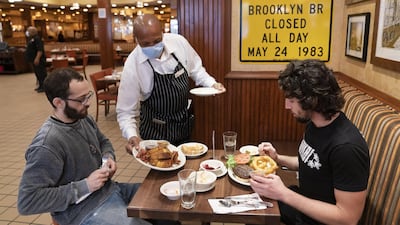Restaurants are already struggling to navigate coronavirus outbreaks and economic shutdowns. Flaky customers aren’t making things any easier.
Amid the pandemic’s uncertainty, US diners are dashing out for a bite in the spur of the moment, instead of the pre-pandemic ritual of a scheduled date night or lunch with a friend. Data from OpenTable, a platform for making reservations, shows that fewer people are reserving tables more than a week in advance than they were a year ago.
That creates a tangible headache for restaurants, particularly in New York, home to many of the world’s best-reviewed – and expensive – restaurants. The industry can no longer rely on bookings, along with historical data, to plan their kitchen inventories.
“Most restaurants are doing walkups instead of reservations,” said Nima Garos, co-owner of the New York’s Jajaja Plantas Mexicana and Gelso & Grand restaurants. The city’s dining experience has become “very casual and on the fly and I think that has translated greatly into people’s trends in reservations”.
Mr Garos said his restaurants now order less food than when they first opened following the pandemic lockdown; this prevents fresh food from going bad and prevents further losses. But now he faces an increased risk of not being able to keep up with demand.
OpenTable has previously estimated that 25 per cent of US restaurants may go out of business due to the pandemic’s impact, as consumers opt to make food at home and social distancing rules place new limits on sales.
To encourage diners with reservations to keep them, some restaurants have started charging fees when diners cancel or fail to show up.
Roland Seeman, who owns the Balade Mediterranean restaurant in Manhattan, said he’s not a fan of cancellation fees. “But now with the pandemic and what’s going on, I have no other choice,” he said. He’s currently mulling whether a $15 to $20 charge would deter last-minute cancellations and no-shows.
Mark Fox, president of Fox Lifestyle Hospitality Group, is also turning to cancellation fees to discourage no shows. The company, which operates the White Oak Tavern and Sapien Foods in Manhattan, is preparing to start charging a fee of up to $25 for indoor tables when eaters flake.
“If a reservation is a no-show, there’s potential that the table is sitting naked for perhaps an hour, and we might have refused two or three parties of walk-ins based on the expectation that guest will arrive,” he said. Walk-ins have helped to compensate for reservation no-shows this summer.
To give restaurant owners a little more clarity, OpenTable says it has added new tools that let owners track aggregate dining patterns in an area.
“A restaurant could zoom into their neighborhood and say, ‘Gosh I look really slow on Tuesday, is everybody else in my area looking slow on Tuesday?’” said Andrea Johnston, chief operating officer at OpenTable. She said this information helps businesses see consumer behavior shifts and adapt accordingly.
Meanwhile, restaurant owners remain focused on congressional discussions, with many saying their business’s survival depends on a federal aid package. US lawmakers have failed so far to extend federal help for the unemployed and small businesses.
“We recognise the efforts that have been made by the our state and city politicians to try to give us tools for success,” Mr Fox said. “But none of them, unfortunately, even collectively, are going to prevent huge loss of small, independent operated restaurants in New York City in the [autumn] without increased dining capacity and the passage of the federal bill in Congress right now.”

